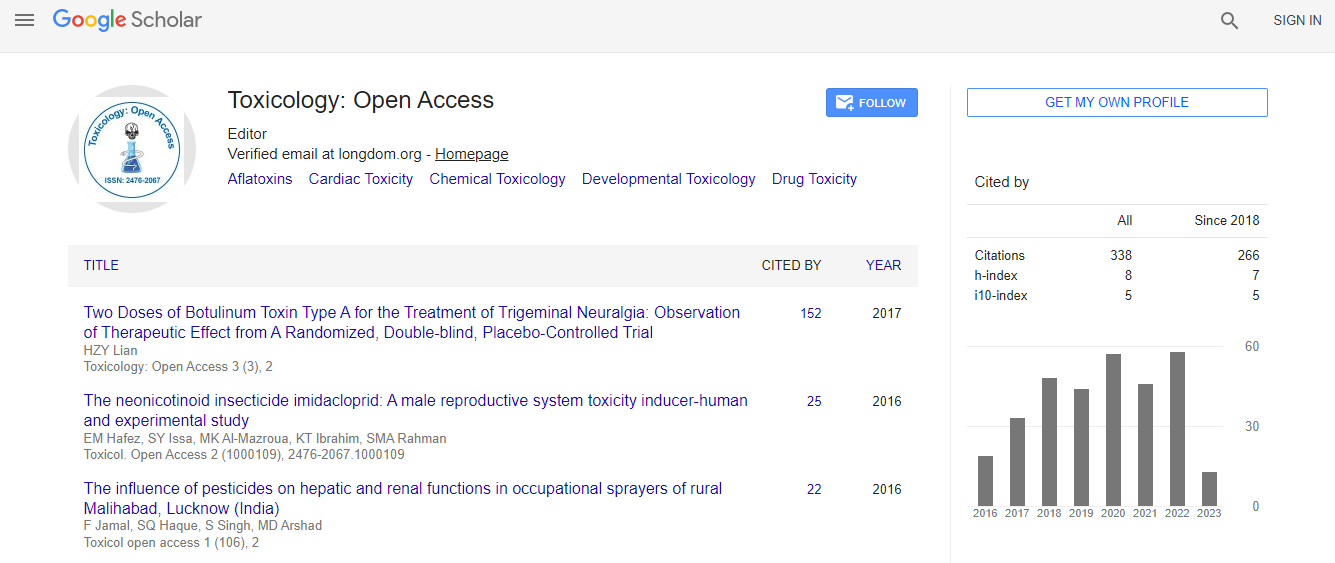Our Group organises 3000+ Global Conferenceseries Events every year across USA, Europe & Asia with support from 1000 more scientific Societies and Publishes 700+ Open Access Journals which contains over 50000 eminent personalities, reputed scientists as editorial board members.
Open Access Journals gaining more Readers and Citations
700 Journals and 15,000,000 Readers Each Journal is getting 25,000+ Readers
Google Scholar citation report
Citations : 336
Toxicology: Open Access received 336 citations as per Google Scholar report
Indexed In
- Google Scholar
- RefSeek
- Hamdard University
- EBSCO A-Z
- Geneva Foundation for Medical Education and Research
- Euro Pub
- ICMJE
Useful Links
Related Subjects
Share This Page
A possible role of Oxytocin on spermatogenesis and steroidogenesis in mouse: An approach towards development of precocious puberty
8th World Congress on Toxicology and Pharmacology
Shabana Anjum, Anuradha and Amitabh Krishna
Banaras Hindu University, India
ScientificTracks Abstracts: Toxicol Open Access
Abstract
The aim of this study was to evaluate the effects of Oxytocin (OT) treatment on the testis of mice. OT treatment produced significant changes in the spermatogenic and steroidogenic activity in the pre-pubertal mice. The mice treated with OT showed increased proliferation of germ cells as indicated by increased accumulation of spermatocytes and round spermatids in the seminiferous tubules. Dose-dependent increase in expression of Oxytocin Receptor (OT-R), Proliferating Cell Nuclear Antigen (PCNA) and Androgen Receptor (AR) proteins were observed in the testis of OT treated mice; when compared with the control further supports the role of OT in spermatogenesis. The pre-pubertal mice treated in vivo with increasing dose of OT showed significant increase in testosterone synthesis due to stimulatory effects of OT on testicular 3 beta HSD activity and increased expression of Steroidogenic Acute Regulatory protein (StAR) and Luteinizing Hormone (LH-receptor) proteins. Further, the in vitro study showed that OT, either alone or together with LH, also promotes testosterone synthesis and StAR level in the testis. The OT treatment also affects testicular expression of BCL-2 protein, which may be important for germ cell proliferation and survival. This study, thus suggests the role of OT in regulating testicular activity of pre-pubertal mice to attain precocious puberty.Biography
Shabana Anjum obtained her PhD degree from Banaras Hindu University. She has published 5 papers and book chapters in reputed international journals and has been awarded in National Conference on Society for Reproductive Biology and Comparative Endocrinology. She has presented many papers in national and international conferences.
Email: anjum6repro@gmail.com

 Spanish
Spanish  Chinese
Chinese  Russian
Russian  German
German  French
French  Japanese
Japanese  Portuguese
Portuguese  Hindi
Hindi 